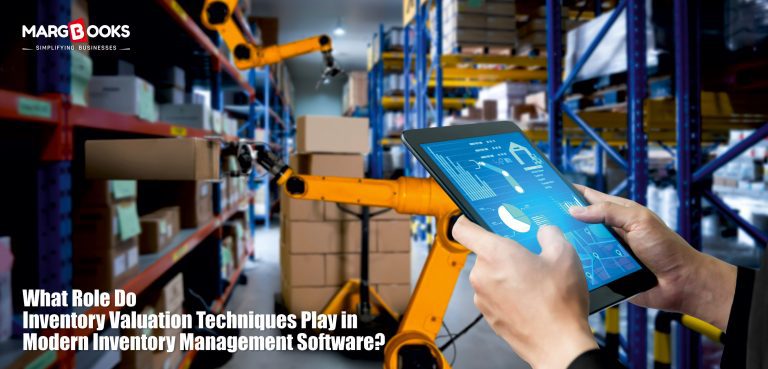In today’s fast-paced business environment, efficient inventory management can make or break a company. With the rise of digital transformation, businesses-especially in retail, manufacturing, and distribution-are turning to Inventory Management Software to keep operations smooth and costs in check. But one critical component that often gets overlooked in conversations about inventory software is Inventory Valuation Techniques.
So, why are these techniques so important? How do they influence business decisions? And what role do they play in modern software like MargBooks, which is considered one of the Best Inventory Software in India? Let’s dive right in.
What are Inventory Valuation Techniques?
Inventory valuation techniques are methods businesses use to determine the value of unsold inventory. This isn’t just for record-keeping-it has a direct impact on the cost of goods sold (COGS), profit margins, and even tax liabilities.
The most common inventory valuation methods include:
- FIFO (First-In, First-Out)
Assumes the oldest inventory items are sold first. Ideal for perishable goods. - LIFO (Last-In, First-Out)
Assumes the newest inventory items are sold first. Useful when prices are rising, though not permitted under Indian accounting standards. - Weighted Average Cost (WAC)
Calculates an average cost for all units in inventory. It simplifies accounting but may not reflect actual costs accurately. - Specific Identification
Tracks each item individually. Best for high-value or unique products like jewellery or automobiles.
Why Do Inventory Valuation Techniques Matter?
At first glance, these might seem like dry accounting principles. But the reality is, your choice of inventory valuation technique can significantly influence your business in the following ways:
1. Financial Reporting
Inventory directly affects your cost of goods sold, and by extension, your gross profit and net income. Choosing the right technique ensures your books reflect your business reality.
2. Taxation
Some methods can result in lower profits on paper, which might reduce taxable income. However, Indian tax laws often require adherence to specific methods, so aligning with compliance is crucial.
3. Cash Flow Management
If your inventory appears overvalued or undervalued, it can mislead you about how much capital you really have on hand. That impacts decision-making around purchasing, pricing, and investments.
How Modern Inventory Management Software Simplifies Valuation
Modern businesses no longer rely on Excel sheets or manual records to keep track of their stock. Instead, they use smart solutions like Inventory Management Software, which can automate the process and bring in a layer of accuracy that is impossible to match manually.
Here’s how modern software like MargBooks integrates inventory valuation seamlessly:
1. Real-Time Calculation
As you receive and sell goods, the system automatically updates the valuation using your chosen method (e.g., FIFO or WAC).
2. Customisable Valuation Methods
Different businesses have different needs. MargBooks allows flexibility in choosing and switching valuation methods based on your business model and compliance needs.
3. Audit-Ready Reports
At the end of the financial year-or even month-end-you can generate valuation summaries, stock registers, and COGS reports at the click of a button.
4. GST & Compliance Friendly
Valuation isn’t just about internal reporting. It has to align with Indian GST laws and accounting practices. Software like MargBooks ensures that your valuation methods are compliant and audit-proof.
Benefits of Using Inventory Management Software with Valuation Features
Still wondering if you should invest in full-fledged inventory software that includes valuation tools? Here’s a quick list of benefits:
- Saves Time & Manual Effort
- Reduces Errors in Inventory Accounting
- Improves Decision-Making with Real-Time Insights
- Helps in Optimising Stock Levels and Avoiding Overstocking
- Simplifies Tax Filing and Audit Preparation
Why MargBooks is Among the Best Inventory Software in India
When it comes to choosing a platform that handles everything-from inventory tracking to valuation—MargBooks stands out for multiple reasons:
- User-Friendly Interface suitable for small businesses and large enterprises alike
- Customisable Modules for various industries including pharma, retail, and FMCG
- Built-in Valuation Tools to support FIFO, WAC, and more
- Strong Customer Support to help you navigate compliance and software use
- Cloud-Based Access so you can manage inventory anytime, anywhere
For Indian businesses looking to streamline operations while staying GST-compliant, MargBooks offers an unbeatable combination of reliability, affordability, and ease of use.
Final Thoughts
In the broader scheme of business operations, Inventory Valuation Techniques may not seem glamorous-but they are foundational. They affect everything from profit margins to taxation, and poor valuation choices can lead to serious financial missteps.
This is where modern Inventory Management Software like MargBooks steps in to simplify things. With accurate real-time valuation, customisable settings, and robust reporting, it’s no wonder MargBooks is being rated among the Best Inventory Software in India.
If you’re still managing inventory manually or using outdated systems, it’s high time to upgrade. Let your inventory system do more than just track stock—let it guide smarter business decisions.




